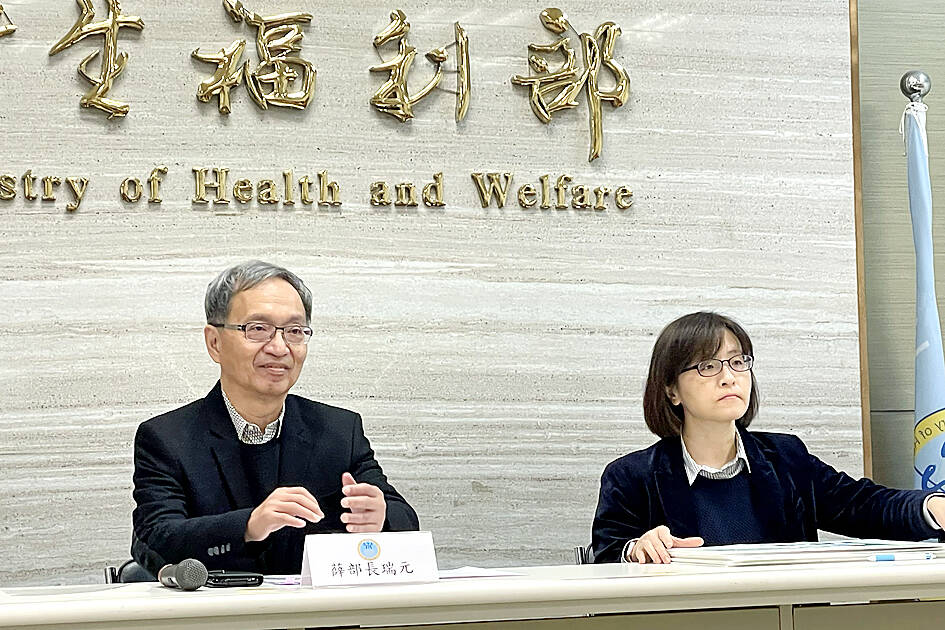New regulations expanding the scope of telemedicine and the issuance of prescriptions are to take effect on July 1, which are expected to benefit millions of people, the Ministry of Health and Welfare said yesterday.
The ministry has amended the Rules of Medical Diagnosis and Treatment by Telecommunications (通訊診察治療辦法) that would add five special circumstances in which telemedicine would be allowed, as well as ease the rules on issuing prescriptions and expanding the types of healthcare services provided through telecommunications.
According to Article 11 of the Physicians Act (醫師法), physicians may not treat or issue prescriptions or a certificate of diagnosis to people they have not examined in person, Minister of Health and Welfare Hsueh Jui-yuan (薛瑞元) said. However, they may use telemedicine to treat people residing in certain areas (such as mountainous or remote areas) or under special or urgent circumstances, Hsueh added.

Photo: Chiu Chih-jou, Taipei Times
As telemedicine became more widely used during the COVID-19 pandemic and is becoming a new normal for healthcare, regulations have been carefully modified to expand the special circumstances in which it might be used, he said, adding that it is expected to benefit up to 2.47 million people.
The five new special circumstances cover patients in a chronic care program, under hospice care, institutionalized at correction agencies, under disability care or under care for illness or injury from a disaster, infectious disease or other major incidents, Department of Medical Affairs Director-General Liu Yueh-ping (劉越萍).
These would bring the total number of circumstances eligible for receiving telemedicine to 10.
However, not all patients in any of the 10 circumstances are directly eligible for telemedicine, Hsueh said.
They must also be included in one of two categories: programs approved by the local health department and National Health Insurance (NHI) bundled payment programs.
“This means that when healthcare facilities want to provide telemedicine to patients under special circumstances, they must write a proposal and obtain approval” from the competent authority, he said. “It does not mean every patient who fall under any of the 10 special circumstances can directly book a telemedicine appointment with a doctor.”
Physicians who use telemedicine on patients who do not meet these qualifications may be fined between NT$20,000 and NT$100,000 for breaching the Physicians Act, Hsueh said.
The amendments would also allow physicians to issue prescriptions through telecommunication methods under certain conditions, and expand the types of healthcare services they can provide, including medical consultation, physician-to-physician consultation, psychotherapy, and issuing examination and check-up sheets, Liu said.
Asked why the draft amendments were announced last year, but it took almost a year for the ministry to announce their formal implementation, Hsueh said that some clinics expressed concern that the changes would encourage people to ditch clinics in favor of telemedicine consultation in hospitals.
However, clinics have since accepted the changes, as only clinics can provide healthcare services from the NHI bundled payment programs, such as the home-based medical integration program and the family physician care program, he added.
To prepare for the implementation of the amendments on July 1, the ministry is preparing and working on supplementary measures, including the digital NHI card system, e-prescription system, drug delivery method and information security verification standards.

SECURITY: As China is ‘reshaping’ Hong Kong’s population, Taiwan must raise the eligibility threshold for applications from Hong Kongers, Chiu Chui-cheng said When Hong Kong and Macau citizens apply for residency in Taiwan, it would be under a new category that includes a “national security observation period,” Mainland Affairs Council (MAC) Minister Chiu Chui-cheng (邱垂正) said yesterday. President William Lai (賴清德) on March 13 announced 17 strategies to counter China’s aggression toward Taiwan, including incorporating national security considerations into the review process for residency applications from Hong Kong and Macau citizens. The situation in Hong Kong is constantly changing, Chiu said to media yesterday on the sidelines of the Taipei Technology Run hosted by the Taipei Neihu Technology Park Development Association. With

CARROT AND STICK: While unrelenting in its military threats, China attracted nearly 40,000 Taiwanese to over 400 business events last year Nearly 40,000 Taiwanese last year joined industry events in China, such as conferences and trade fairs, supported by the Chinese government, a study showed yesterday, as Beijing ramps up a charm offensive toward Taipei alongside military pressure. China has long taken a carrot-and-stick approach to Taiwan, threatening it with the prospect of military action while reaching out to those it believes are amenable to Beijing’s point of view. Taiwanese security officials are wary of what they see as Beijing’s influence campaigns to sway public opinion after Taipei and Beijing gradually resumed travel links halted by the COVID-19 pandemic, but the scale of

A US Marine Corps regiment equipped with Naval Strike Missiles (NSM) is set to participate in the upcoming Balikatan 25 exercise in the Luzon Strait, marking the system’s first-ever deployment in the Philippines. US and Philippine officials have separately confirmed that the Navy Marine Expeditionary Ship Interdiction System (NMESIS) — the mobile launch platform for the Naval Strike Missile — would take part in the joint exercise. The missiles are being deployed to “a strategic first island chain chokepoint” in the waters between Taiwan proper and the Philippines, US-based Naval News reported. “The Luzon Strait and Bashi Channel represent a critical access

Pope Francis is be laid to rest on Saturday after lying in state for three days in St Peter’s Basilica, where the faithful are expected to flock to pay their respects to history’s first Latin American pontiff. The cardinals met yesterday in the Vatican’s synod hall to chart the next steps before a conclave begins to choose Francis’ successor, as condolences poured in from around the world. According to current norms, the conclave must begin between May 5 and 10. The cardinals set the funeral for Saturday at 10am in St Peter’s Square, to be celebrated by the dean of the College